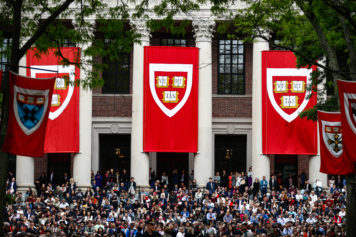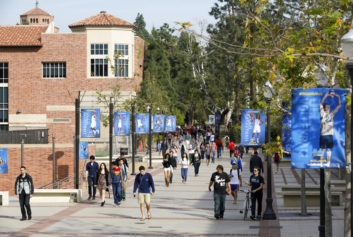While the attack on affirmative action has typically featured white students claiming that Blacks and Hispanics were stealing college admissions slots that rightfully belonged to them, the lawsuit filed yesterday against the admissions policies of Harvard has one key difference: This time it’s Asian students claiming that Black and Hispanic applicants are taking their slots.
The court’s conservative majority has shown a willingness in the past to strike down racial preference in admissions at public institutions, giving hope to opponents of affirmative action that this suit against a prestigious private school could mean the end of the policy in all university admissions. If the suit is successful, along with a suit filed against the University of North Carolina at Chapel Hill yesterday, some experts estimate it could reduce the Black student population at elite universities—which is already extremely paltry—by as much as 50 percent.
The Asian plaintiffs in the suit, which was filed by the Project on Fair Representation, claim Harvard’s affirmative action policies discriminated against Asians who were rejected by admissions despite having higher test scores and grade-point averages than Black and Hispanic students who were accepted.
Edward Blum, who runs the Project on Fair Representation, said it is a clear case of favoring certain racial groups over others.
“Quotas and racial balancing are strictly against the law,” Blum told Fox News. It was Blum’s group that sued the University of Texas on behalf of a white applicant over its affirmative action admissions policies in a case that went to the U.S. Supreme Court last year.
The Supreme Court disappointed opponents of affirmative action looking for a resounding rejection of the controversial policy by issuing a 7-1 ruling sending the University of Texas affirmative action case back to the lower court. With the ruling the court concluded that the lower court did not bring enough scrutiny to UT’s use of race. The case is still pending.
In claiming that the lower court misinterpreted an earlier Supreme Court decision, the Supreme Court made it more difficult for University of Texas to prove that its affirmative action program is constitutional.
It was a narrow victory for Abigail Fisher, the white woman who initiated the challenge by claiming UT-Austin unconstitutionally discriminated against her after the university rejected her 2008 application under its race-conscious admissions program.
While Justice Anthony Kennedy, writing for the majority, appeared to endorse the Supreme Court’s earlier decisions establishing that affirmative action is constitutional if it is used to foster a diverse student body, the court established that a race-conscious program could only be used if it was the only way to increase diversity.
The court majority felt that the U.S. Court of Appeals for the 5th Circuit hadn’t pushed UT enough to prove that its race-conscious admissions program was the only available way to foster diversity.
“The university must prove that the means chosen by the university to attain diversity are narrowly tailored to that goal. On this point, the university receives no deference,” Kennedy wrote. “Strict scrutiny must not be strict in theory but feeble in fact.”
The Harvard case is different from the Texas case because it focuses on affirmative action’s negative impact on a minority group, Asians, not on whites.
The lawsuit uses a 2009 study done by Princeton sociologists that concluded while the average Asian-American applicant needed a 1460 SAT score to be admitted, a white student with similar GPA and other qualifications only needed a score of 1320, while Blacks needed 1010 and Hispanics 1190.
This is an issue that has been bubbling just below the surface for years, as Asians began to receive rejections at schools like Berkeley, Harvard, Yale and Columbia despite having higher scores than other applicants. Many Asians sensed that these schools were trying to hold down their Asian populations at the expense of qualified Asian applicants. If a college wanted to avoid having a disproportionately high number of Asian enrollees, it would have to hold them to a higher standard.
Blum’s group also filed suit against UNC Chapel Hill for discriminating against both whites and Asians.
Harvard issued a statement defending it admissions policy.
“The College considers each applicant through an individualized, holistic review having the goal of creating a vibrant academic community that exposes students to a wide-range of differences: background, ideas, experiences, talents and aspirations,” wrote Robert Iuliano, Harvard’s general counsel, in an email to Fox News, adding that the school’s policy is legal.
The lawsuit pointed out that in the advice that the Princeton Review, a popular college guide, gives to Asian students, it says, “Don’t attach a photograph to your application and don’t answer the optional question about your ethnic background…Write about something entirely unrelated to your ethnic background.”
The lawsuit claims that the repeated attacks on affirmative action “only perpetuate the hostilities that proper consideration of race is designed to avoid. Racial preferences are a dangerous tool and may only be used as a last resort. There is now overwhelming evidence that race-neutral alternatives render reliance on racial preferences unnecessary.”
The suit suggests that elite schools give greater consideration to students with economic needs, which are known as “race neutral” polices. The suit claims these are more effective in promoting diversity than race-based polices.
In a move that could prove extremely unpopular among deep pocketed alumni at these elite schools, the lawsuit also aims to do away with “legacy” admissions that lower the academic bar for the children of alumni—admitting legacy applicants five times the rate of other applicants.
In addition, the lawsuit challenges early admission filings, which tend to hurt low income and minority applicants and give an unfair advantage to wealthy and white students.
Tim Groseclose, a professor of Economics at George Mason University, told Breitbart News that the case against Harvard is pretty remarkable because, while some states have laws that disallow public universities to give racial preferences, “…this lawsuit has a much broader scope. If successful, it will mean that no university, not even a private one, can give racial preferences, as long as it receives federal funding.”
“If the results are similar to the results of California’s Prop. 209 [which outlawed affirmative action in California’s university system], the lawsuit would cause African-American admissions to drop something like 40 or 50 percent at an elite university, and it would cause Asian admissions to rise about 10 percent,” said Groseclose, who has held faculty positions at UCLA, Caltech, Stanford, Ohio State, Harvard and Carnegie Mellon University.


